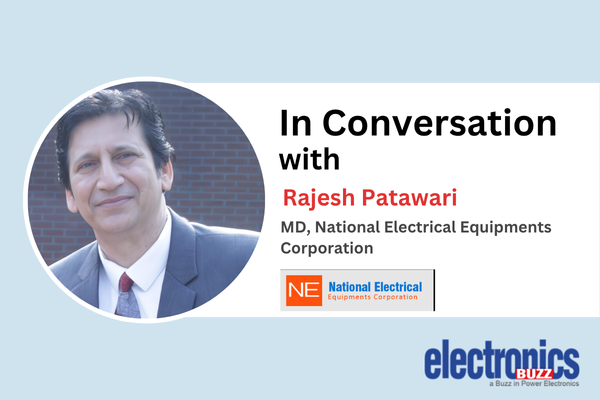In an interview with Electronics Buzz, Rajesh Patawari, Managing Director of National Electrical Equipments Corporation (NEEC), shares the company’s journey of global expansion, commitment to sustainable innovation, and balancing legacy with modernization. He highlights NEEC’s role in powering emerging markets, embracing smart technologies, and building strong local partnerships while making a meaningful social impact through workforce development and community-focused initiatives.
Read the full interview here:
EB: NE has established a strong presence in power distribution across 20+ countries. What key strategies have driven this global expansion, particularly in tapping into emerging markets?
Rajesh: Our global growth has been rooted in three pillars: product reliability, customization, and strong local partnerships. Emerging markets often present unique voltage profiles, environmental challenges, and regulatory frameworks. We’ve invested in understanding these nuances and built transformers that are tailor-made for diverse geographies—from sub-Saharan Africa to Southeast Asia. Additionally, our strategy to collaborate with on-ground EPC firms and offer responsive after-sales support has helped us earn long-term trust. Being agile in our approach while maintaining Indian manufacturing quality has been pivotal in positioning NE as a dependable name globally.
EB: Your leadership has placed a strong emphasis on energy-efficient innovation, including ISI-certified and star rated transformers. How is NE staying ahead of the curve in delivering sustainable and future-ready power solutions?
Rajesh: Energy efficiency isn’t just a regulatory checkbox for us—it’s a responsibility. We’ve aligned our R&D with national and global decarbonization goals. Our star rated and ISI-certified transformers are designed with low-loss core materials, superior winding configurations, and digital monitoring for proactive efficiency management. But we’re not stopping there—our upcoming roadmap includes integration of IoT-based predictive diagnostics and transformer health monitoring systems, particularly for utilities looking to reduce downtime and transmission loss. By marrying traditional engineering strength with smart technology, we are shaping the grid of tomorrow.
EB: NE has partnered with leading State Electricity Boards and EPC giants like Polycab, VTL etc. Could you share some of the most challenging yet rewarding projects you’ve undertaken in collaboration with them?
Rajesh: One standout project was with a major OPTCL, Tata Power, where we had to supply 33/11 kV transformers of lowest losses ever achieved in India for those rating—within a tight timeline. The terrain, logistics, and weather made execution extremely difficult. But thanks to close coordination with the EPC partner and our on-ground service team, we completed the job ahead of schedule. It was rewarding to see our team’s engineering and project management capabilities match the standards of top-tier infrastructure players.
EB: As a third-generation leader in a family-run enterprise, how do you strike a balance between preserving traditional business values and steering NE toward modernization and global growth?
Rajesh: I see tradition and innovation not as opposites, but as complementary forces. The core values passed down from my father and grandfather—integrity, client focus, and relentless quality—are non-negotiable. However, the way we execute them today has evolved. We’ve introduced ERP systems, digitized our production planning, upgraded to CNC-based manufacturing, and actively invested in talent that brings fresh ideas to the table. I try to lead with humility, listening to both senior mentors and young engineers. Our goal is to create a culture where legacy gives us roots, and innovation gives us wings.
EB: With electricity demand rising steadily, how is NE preparing to meet the future needs of India’s power distribution sector—especially in terms of ramping up manufacturing, embracing new technologies, and enhancing after-sales service?
Rajesh: India’s power landscape is transforming rapidly, and we’re evolving with it. We’ve expanded our plant capacity and adopted lean manufacturing to increase efficiency without compromising quality. On the tech front, we’re integrating smart components like load sensors, temperature monitors, and overload alarms to make our transformers grid-ready and future-proof. We’ve also invested in a dedicated after-sales service wing that ensures faster resolution, preventive maintenance, and training for DISCOM technicians. We believe the future belongs to manufacturers who deliver not just products, but complete energy solutions.
EB: NE’s commitment to CSR and workforce development demonstrates a broader vision beyond business. Can you highlight a few initiatives that reflect the company’s social impact and dedication to community building?
Rajesh: We’ve always believed that business growth must walk hand-in-hand with community upliftment. One initiative close to my heart is our technical training program for ITI and diploma students, where we offer hands-on workshops and internships, especially in underserved regions. We also sponsor solar-based street lighting in rural areas around our manufacturing units to promote clean energy access. During peak summer months, we conduct transformer health drives in collaboration with local DISCOMs to prevent outages. These initiatives go beyond compliance—they reflect our commitment to building a more resilient and inclusive energy ecosystem.













